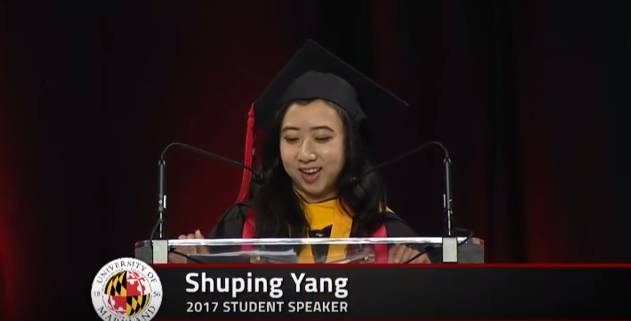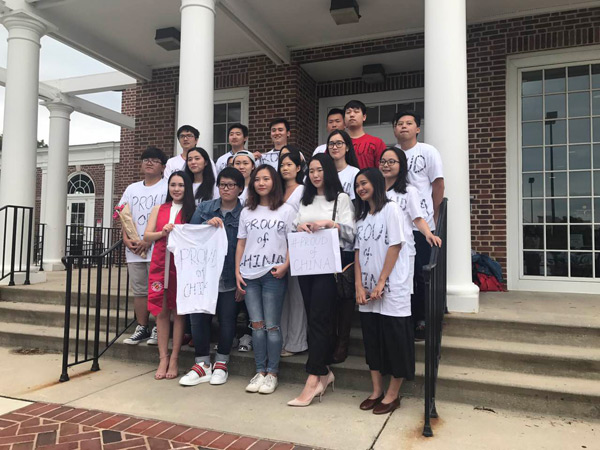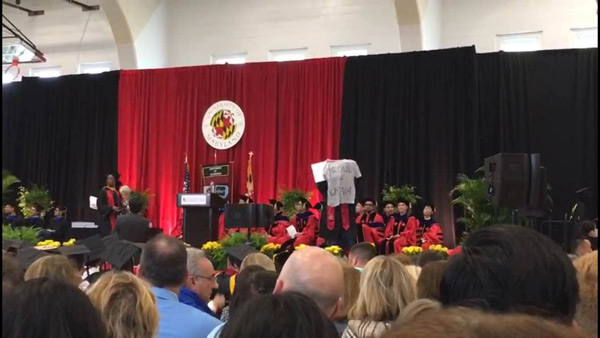An online “Proud of China” campaign has been launched by students and graduates of the University of Maryland, after the commencement speech by a student representative from China was slammed for bolstering negative Chinese stereotypes.
The speech, given by Yang Shuping on May 21 (local time), began with Yang’s claim that “fresh air” was what drove her to pursue an education in the U.S. This claim quickly triggered outrage among netizens and other Chinese students at the university.
On May 22 (local time), a Chinese student surnamed Guo held up a T-shirt reading “#Proud of China” at the commencement ceremony for the Department of Economics, publicly kicking off the spontaneous campaign. Several Chinese students rallied that afternoon wearing similar hand-drawn T-shirts and shouting their slogan: “We are from the University of Maryland! We are proud of China!”
According to a statement from the organizers of the campaign, the “Proud of China” campaign was launched as an inclusive effort for people to show pride in China, regardless of age or occupation.
“With regards to the speech, we aren't trying to attack anyone. There is no other message than ‘I am proud of China’ that can properly convey our attitude. Even though we may be nobody as individuals, together we make a difference,” the statement read. The campaign also called on Chinese nationals to take photos with “Proud of China” T-shirts or posters.
“The University of Maryland has a diverse and welcoming campus, which the university takes pride in ... I hope our future fellow students can see that Terps [the university's athletics mascot] are rational and united when it comes to the matter of right and wrong. This campaign also serves as a chance to tell our fellow compatriots that we overseas students have never forgotten our motherland or who we are, and that the love for our nation has never faded in spite of the distance,” an anonymous campaign organizer told the People’s Daily Online, adding that their campaign has no relation to the university’s Chinese Students and Scholar Association.
In an apology released on her Sina Weibo on May 22, Yang said that she loves China and her hometown, and is “deeply proud of my country’s prosperous development.” The young woman stated that she had no negative intentions in giving her speech, and she hopes to promote Chinese culture based on her studies in the U.S. and contribute to China's development.
Amid the controversy, a university statement was released, claiming that the school “proudly supports Shuping’s right to share her views and her unique perspectives, and we commend her on lending her voice on this joyous occasion,” the Global Times reported.

On Sina Weibo, the topic of Yang’s speech had received more than 50 million views as of press time. Yang’s apology has also been reposted over 59,000 times, attracting a number of unfriendly comments and criticism. Many reposted the speech with a famous quotation, allegedly from the first batch of Chinese overseas students in the Qing Dynasty. The quotation states that the students' only goal for their pursuits in the West was to help their motherland prosper independently.
Another group of netizens expressed support for Yang, arguing that to criticize one’s motherland for its problems does not constitute shaming. In China’s case, this means talking openly about pollution. It is through the process of detection and problem-solving, they wrote, that a nation can further develop.
Meanwhile, some pointed out that Kunming, Yang’s hometown, is in fact far from how she described it - as so polluted that she had to wear a mask when going out.
Late on May 22, the government of Kunming refuted via Sina Weibo that the city is plagued by bad air. As of May 8, the percentage of days in 2017 with good air quality was 100 percent in Kunming.
“The air in Kunming is more than likely to be ‘sweet and fresh,’” read the government's statement, using the same words Yang used to describe the air in the U.S.



















